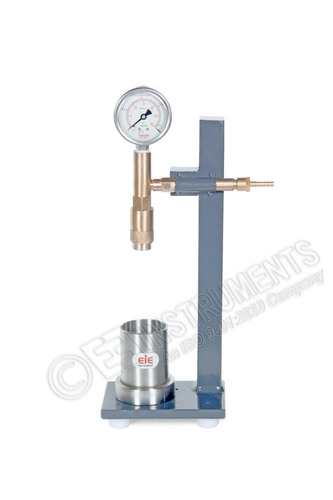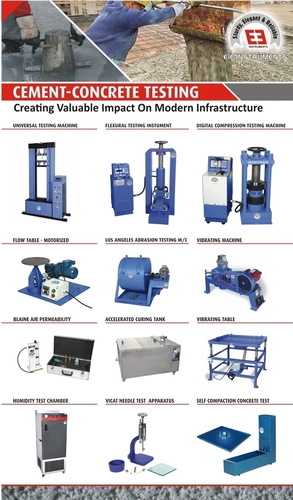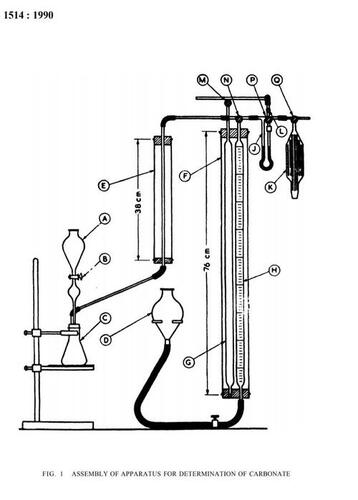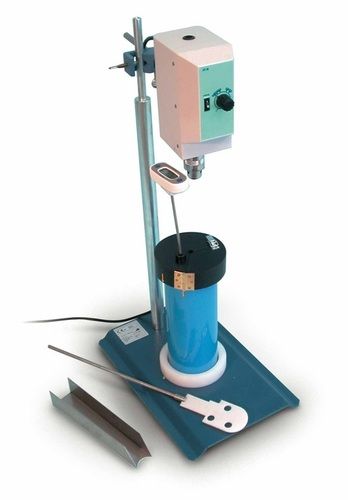Modulus of Elasticity for Rock/ Concrete
Modulus of Elasticity for Rock/ Concrete Specification
- Automation Grade
- Semi Automatic
- Product Type
- Modulus of Elasticity for Rock / Concrete
- Application
- Industrial
- Operate Method
- Electric
- Voltage
- 220-240 Volt (v)
- Color
- Blue
- Weight
- 417 Kilograms (kg)
- Features
- Accurate results, Robust construction, Efficient working
- Material
- Mild Steel
- Usage
- Laboratory
Modulus of Elasticity for Rock/ Concrete Trade Information
- Minimum Order Quantity
- 1 Piece
- Supply Ability
- 10 Pieces Per Month
- Delivery Time
- 7-10 Days
- Packaging Details
- Wooden Box
About Modulus of Elasticity for Rock/ Concrete
COMPRESSION TESTING MACHINE - 500 KN-AUTOMATIC PACE RATE CONTROLLED WITH PC MANAGER SOFTWARE TO DETERMINATION OF POISION RATIO AND MOE
Further details available on our website.
Price and specifications mentioned here are subject to change as per the application, customer requirements and prevailing market conditions. Please refer to us for the final rates and offer.
Precision Testing for Material Strength
This apparatus delivers reliable and repeatable results, making it indispensable for laboratories focused on material strength analysis. The sturdy mild steel construction ensures a long service life and maintains alignment during intensive testing procedures. Its design accommodates a range of rock and concrete specimens, promoting versatile applications in quality assessment and research.
User-Friendly Operation
Engineered for efficient laboratory work, this device features intuitive controls, making it accessible even for operators with moderate technical expertise. Compatibility with standard 220-240 Volt power supplies allows easy setup in most laboratory environments across India. Clear indicators and robust design ensure safe and straightforward operation.
FAQs of MODULUS OF ELASTICITY FOR ROCK / CONCRETE:
Q: How is the modulus of elasticity measured using this apparatus?
A: The modulus of elasticity is measured by applying a controlled load to rock or concrete samples and recording the resulting deformation. The apparatus calculates the elastic modulus based on the relationship between stress and strain during the loading process.Q: What materials can be tested with this equipment?
A: Primarily, this apparatus is suitable for testing the modulus of elasticity in rock and concrete samples. Its robust mild steel frame and versatile design accommodate various sample sizes as encountered in industrial and research laboratories.Q: When should the modulus of elasticity test be conducted?
A: The test is generally performed during the material quality assessment phase, prior to the use of rock or concrete in construction or research projects. It ensures that the mechanical properties meet the required specifications.Q: Where can this testing apparatus be purchased or sourced in India?
A: This apparatus is available throughout India via multiple avenues including manufacturers, exporters, suppliers, service providers, and traders who specialize in laboratory equipment for the industrial sector.Q: What is the process for setting up and using the apparatus in a laboratory?
A: To use the apparatus, first install it on a stable, flat surface and connect it to a 220-240 Volt power source. Position the rock or concrete sample, calibrate the device as per the manual, and proceed with the testing sequence as outlined in the operational guidelines.Q: How does this equipment benefit industrial or research laboratories?
A: This apparatus provides accurate, reliable measurements of elastic properties, aiding in material selection, quality assurance, and compliance with engineering standards. Its precision helps optimize structural design and research outcomes.Q: Can the apparatus be used for both educational and professional laboratory settings?
A: Yes, the apparatus is suitable for a range of environments, from academic laboratories focusing on teaching material science, to professional labs that require rigorous material testing for industrial purposes.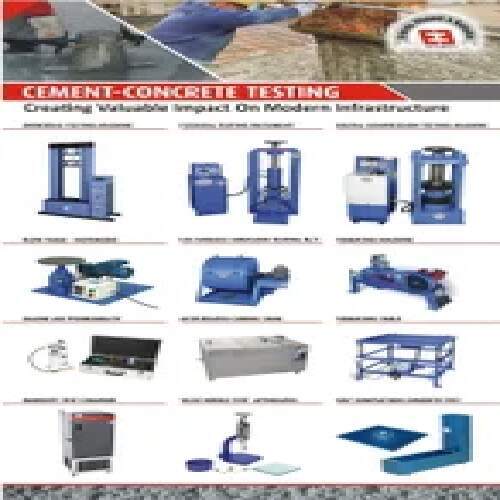

Price:
- 50
- 100
- 200
- 250
- 500
- 1000+
More Products in Cement Testing Equipment Category
Wet Sieving Apparatus - (Fly Ash Testing Apparatus)
Price 1.00 INR / Piece
Minimum Order Quantity : 1 Piece
Automation Grade : Manual
Features : Rugged MS body, corrosionresistant, watertight sieve assembly
Application : Used for determining the fineness of fly ash
Usage : Cement Testing Equipment
Lime Reactivity Cabinet
Price 1.00 INR / Piece
Minimum Order Quantity : 1 Piece
Automation Grade : Semiautomatic
Features : Digital timer, Stainless steel construction, Inbuilt temperature control
Application : Testing reactivity of hydrated lime as per IS 6932
Usage : Laboratory reactivity test
ASSEMBLY OF APPARATUS FOR DETERMINATION OF CARBONATE
Price 1.00 INR / Piece
Minimum Order Quantity : 1 , , Piece
Automation Grade : Manual
Features : Leakproof Joints, Easy Assembly, Resistant to Acids
Application : ASSEMBLY OF APPARATUS FOR DETERMINATION OF CARBONATE IN LIME
Usage : Determination of Carbonate content in Lime and Cement
Lime Reactivity Test Apparatus
Price 1.00 INR / Piece
Minimum Order Quantity : 1 Piece
Automation Grade : Manual
Features : Corrosionresistant construction, Easy to operate, Glass thermometric tube
Application : Used for determining the reactivity on slaking of ground quicklime.
Usage : Cement Testing Equipment
 |
EIE INSTRUMENTS PVT. LTD.
All Rights Reserved.(Terms of Use) Developed and Managed by Infocom Network Private Limited. |

 Send Inquiry
Send Inquiry
